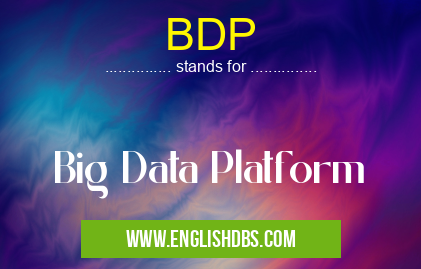What does BDP mean in UNCLASSIFIED
A Big Data Platform is an integrated system that supports the processing and storage of large amounts of data, often from multiple sources. It enables users to access, analyze, and manage complex datasets for various applications such as predictive analytics, machine learning, pattern recognition, real-time monitoring and more.

BDP meaning in Unclassified in Miscellaneous
BDP mostly used in an acronym Unclassified in Category Miscellaneous that means Big Data Platform
Shorthand: BDP,
Full Form: Big Data Platform
For more information of "Big Data Platform", see the section below.
Essential Questions and Answers on Big Data Platform in "MISCELLANEOUS»UNFILED"
What is a Big Data Platform?
What are the benefits of using a Big Data Platform?
The use of a Big Data Platform provides several benefits such as improved efficiency in analyzing large volumes of data; it enables data scientists to discover previously hidden patterns in data; it offers improved scalability and flexibility; it also facilitates cost-effective data mining operations; and finally, it helps organizations gain actionable insights from their data.
How does a Big Data Platform work?
A Big Data Platform works by integrating multiple technologies into one system in order to process and store large amounts of data. It usually involves Apache Hadoop (a distributed file processing framework) along with other technologies like Apache Spark (in-memory processing framework), NoSQL Databases (schemaless key-value stores) and many others which help bring together different components into one whole system.
What type of technology do I need to run a Big Data platform?
To successfully run a Big Data platform you’ll need an array of technologies such as Apache Hadoop (distributed file processing), Apache Spark (in-memory computational engine), NoSQL Databases (schema-less databases), HDFS (cluster distributed storage), Cloud Computing Solutions (flexible scalability), Machine Learning Algorithms (data analysis) etc.
What type of hardware do I need for a big data platform?
Depending on what type of operations you are looking to perform with your big data platform, the hardware requirements may vary accordingly. Typically, if you are looking for faster performance then you should look at higher end servers with multiple processors or even virtual machines with high computing power capability. You will also need memory intensive machines for processing large datasets, enough disk space for storing the data, networking equipment such as routers and switches and other associated accessories.
Are there any limitations when using big data platforms?
Yes there are certain limitations that arise when working with big data platforms such as scalability issues due to limited network bandwidth or latency issues due to increased distance between the server nodes and/or storage devices etc. There can also be security concerns when working with sensitive information or compliance related restrictions set by regulatory bodies depending on usage geographically or industry specific needs etc.
How secure is my big data on this platform?
Security depends on the implemented policies within your organization but typically most providers offer encryption methods that keep your stored information protected from unauthorized access or alteration. Other measures like authentication protocols, firewalls & anti-virus software can be employed in order to ensure maximum security standards across all platforms used within your organizational structure.
Is there any customer support available if problems arise while using this platform?
Absolutely! Most major providers offer 24/7 customer support through their respective contact channels including phone call centers, email assistance & online ticket submission systems so you can rest easy knowing that help is always available should problems crop up while using the platform service.
Can I customize my big data platform according to my own needs?
Yes indeed! Many providers allow users to customize their platforms according to specific business requirements enabling them to develop bespoke solutions tailored towards particular objectives – whether it’s increasing efficiency levels through automation or improving user experience by introducing new features etc., customization options are available which makes managing your own big data solution much more efficient & cost effective than ever before!
BDP also stands for: |
|
| All stands for BDP |
